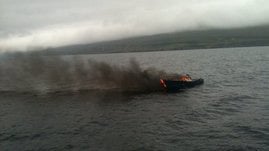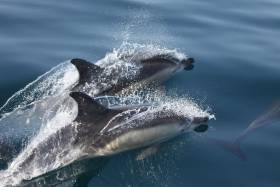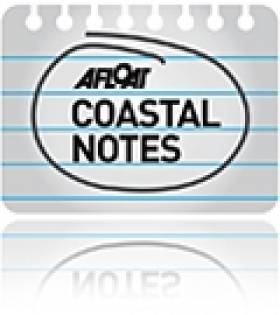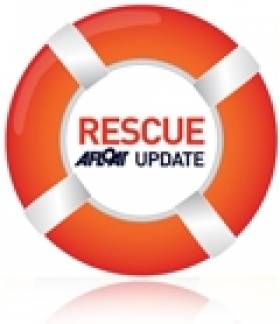Displaying items by tag: Adrigole
Seascapes Podcast: Glandore Classic Boat Summer School, Sailing in West Cork, SmartBay & Open Water Swimming
Hello and welcome aboard this week’s edition of your maritime programme Seascapes – this week we talk to sailing instructor and yachtsman Niall McAllister in Adrigole in West Cork; we have music from Eleanor Shanley and “Sail Away To The Sea”; we preview the Glandore Classic Boat Summer School, we have the second part of our conversation with John Breslin of SmartBay on how he became involved in the maritime world.............. first on Seascapes this week we talk to Open Water swimmer and Steve McQueen fan Ned Denison on the Open Water Swimming calendar and a unique swim in the Southern Hemisphere.......
Ned Denison and Open Water Swimming and that extraordinary swim around Devils Island....the Vibes and Scribes Lee Swim takes place on next Saturday 16th July ..
Originally held in 1914, the annual Vibes and Scribes Lee Swim has become one of the top open water swimming events in Ireland. The course runs through the centre of Cork City, with a distance of around 2 kilometres (1,700m downstream and 300m upstream).
Starting from a specially erected platform at the entrance of the old distillery premises on the North Mall, the contestants swim under all the bridges of the North Channel with the flow of the River Lee until they round the Port of Cork Customs House. They will then continue against the flow of the river to the finishing pontoon in front of the Clarion Hotel.
Most of the swimmers compete for age group prizes, some raise money for local charities and a good number just swim for the enjoyment of the day and the acknowledgement and encouragement of family and friends.......
Congratulations to all in Clontarf Yacht and Boat Club on the completion of the IDRA 14 class wooden dinghy – named “Wicked Sadie” and launched on the last Sunday in June, congratulations to all involved lead by Ronan Melling ...Bravo...
Last week here on Seascapes we talked to John Breslin of Smart Bay well while we were discussing the observatory in Galway Bay and the new technologies that it harnesses we wondered how he became involved in the maritime world .........
John Breslin on the exciting world of technology and the marine and the Smart Bay Observatory ....next week here on Seascapes we’ll hear about a new SeaScience App developed by the Ryan Institute at NUI Galway.....we’ll be talking to Martina Prendergast
........well from Galway to the Glandore Classic Boat Summer School which is on next weekend on Saturday 16th we have all the details on the Seascapes webpage..... speakers include Rui Ferreira, Oliver Hart, Donal Hayes, Dr.Breda Kenny, Dr Charles Luddington, Padraig Whooley, Gary McMahon, John O’Connell, Simon O’Keeffe, Vincent O’Shea, Tiernan Roe, Bill Trafford and others.
Next here on Seascapes to Adrigole in West Cork and sailing instructor , mariner and yachtsman Niall McAllister from the West Cork Sailing and Powerboat Centre .....Niall told us how he became involved and about “Jessy” his Sun Odyssey 37 ....
Meeting for Bantry Bay Fish Farm Opponents Tonight
#COASTAL NOTES - Bantry Bay has reached its capacity for salmon farming, says the committee formed to oppose a proposed new facility at Shot Head.
Save Bantry Bay has called a public meeting for supporters tonight (24 March) at Eccles Hotel in Glengarrif, Co Cork, starting at 8.15pm - where chairman Kieran O'Shea will give a presentation on the group's "wide-ranging objections", as The Fish Site reports.
Minister for the Marine Simon Coveney is currently considering the licence application for Marine Harvet's proposed salmon farm at Shot Head in Adrigole.
Concerns among the committee's members include the potential spoiling of the area's natural beauty having a knock-on effect on tourism, and the environmental consequences of algae blooms from nitrogen and phosphorous waste.
Local fisherman fear that a fish farm of more than 100 acres would see the closing off of part of an "important ground for shrimp and prawn".
Possible infection of wild salmon in local river systems by sea lice from farmed salmon is also an issue, with the Environmental Impact Statement for Shot Head highlighting an outbreak of lice at Marine Harvest's facility in Roancarrig two years ago.
The Fish Site has more on the story HERE.
- Coastal Notes
- Fishing
- Bantry Bay
- Co Cork
- fish farm
- salmon farm
- Shot Head
- Adrigole
- Glengarrif
- Eccles Hotel
- Save Bantry Bay
- Minister for the Marine
- Simon Coveney
- Marine Harvest
- tourism
- environment
- algae blooms
- nitrogen
- phosphorous
- waste
- shrimp
- prawn
- infection
- Wild Salmon
- sea lice
- environmental impact statement
- Roancarrigh
Three Die in Cruiser Fire off West Cork
Three men are dead and a fourth has been injured after a boat went on fire and sank off the West Cork coast this evening. It happened in waters south of Roundcarrig Lighthouse off Adrigole Harbour, Bantry Bay. It is understood a serious fire broke out on the 25-foot cruiser. The RNLI lifeboat went to the cruiser's rescue at 5.45pm. There is no information currently about the type of cruiser involved.

Photo: courtesy of Castletownbere lifeboat
A Coast Guard helicopter spotted the men in the water. The boat was on fire and sinking as they arrived.
The bodies of the three victims have been removed to hospital. It is understood all four men, who were in their 60s, were living in the Glengarriff area.
One of the victims is Irish and the other two men are from other European countries. A fourth man, who survived the incident, has also been taken to hospital.
The boat sank a short while later off Roancarrig, about seven miles from the fishing port. Conditions were calm at the time with some light fog in the bay, the spokeswoman said. Officials from the Marine Casualty Investigation Board will carry out an inquiry into the incident.
It is understood investigations will centre on whether an explosion in the engine caused the fire.
Press Release from RNLI:
Lifeboat crew with Castletownbere RNLI responded to a callout out this evening (Monday 16 August 2010) to a 25-foot cruiser on fire seven miles off the coast of Castletownbere, off Adrigole Harbour in Bantry Bay. The Shannon based Coast Guard helicopter was on scene and recovered four casualties from the water. Three were pronounced dead and one was taken to Cork University hospital for treatment.The Castletownbere all weather lifeboat was requested to launch at 17.41 hrs in calm conditions. On arrival at the scene the lifeboat volunteers witnessed the vessel on fire and the CG helicopter was recovering the casualties from the water. The Shannon based helicopter had been out on a callout and was in the area. The lifeboat was designated on scene commander and stayed on scene until the burning cruiser sank.
































































